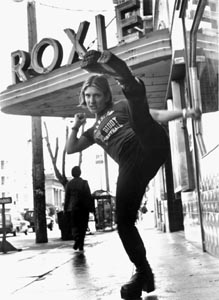Women's Nights
Rebecca McBride
Thanks to MadCat, female filmmakers have a festival of their own in San Francisco
By Michelle Goldberg
San Francisco has a film festival for nearly every constituency--a gay and lesbian film festival, a Jewish film festival, an Arab film festival, an Asian American film festival--but before Ariella Ben-Dov launched MadCat last year, there was no women's film festival. "When I was thinking of doing a women's festival, I would look through catalogues of festivals that are open to both men and women, and in all of those festivals there were more men than women," Ben-Dov said. "Women are making work, even though there's a financial crunch and there's no funding right now. MadCat has received hundreds of entries from all over the country. Why aren't these women being curated? Part of me thinks maybe the stuff that women are making is too edgy or too complicated."
Now in its second year, the three-day festival specializes in the edgy and complicated, favoring abstract, experimental films and animations over traditional narratives and talking-head documentaries. MadCat features 55 short films, panel discussions and pioneering features that range from earnest feminist polemics to raunchy sexploitation. This year will even include a tribute to Doris Wishman, director of notorious '60s B-movies and soft-core porn.
Ben-Dov has sought to make difficult films accessible to audiences who aren't film buffs or theory nerds by sandwiching them with more straightforward entertainments. Thus Erica Cho's adorable animation "Kimberly Bahp Makes Sushi for Two," which gently savages food snobs, opens for Kathleen Sweeney's lovely but opaque "Philomela Speaks," a short that seems to cram a whole women's studies syllabus into 19 minutes. Kim Ladin's impenetrable "New World Dictionary" is balanced by Gail Noonan's fabulous cartoon "Your Name in Cellulite," a satire in which a woman's body rebels against the torturous beauty rituals imposed on it.
For some reason, there's always been a connection between women and experimental film--my university even offered a class called Gender and Independent Video. "Linear narrative tends to be a more phallocentric kind of a narrative," says Sweeney, director of "Philomela Speaks." "When you disrupt that linearity, you're able to get into a more circular or woven narrative that may be better aligned with women's issues. Linear narrative is very much based around the climax. There's a leading up to a climactic point that's very much like male sexuality. When you get out of that linear structure, you're able to explore more the polymorphous sensuality of the filmic medium."
There's not a trace of linear narrative in Sweeney's film, and though it reeks of too much time spent in graduate school (Neil Armstrong on the moon is treated as a metaphor for rape, for men trying to take control of "women's moon"), there are also some beautiful and very witty moments--in one sequence, a women's talking profile is superimposed onto the faces of Marilyn Monroe, Elizabeth Taylor and various other Hollywood starlets.
Other films are far more accessible. One of the festival's highlights, "Bad Mood Woman," is only one minute and 14 seconds long, but it's long enough to wish that someone would give director Alison Murray a feature budget. It's a faux tampon ad where a menstruating woman goes on a killing spree after a smarmy colleague tells her to "have a nice day." At the end we see a logo for "Carnage Tampons," decorated with Edvard Munch's "The Scream," and the slogan "Better Red than Dead."
Local filmmaker Valerie Soe contributes a sharp, funny film about her obsession with Hong Kong action star Chow Yun-Fat that expands into an exploration of Asian male sexuality. "I live with a blue-eyed man, and I dream about Chinese movie stars," she says. One of the men she interviews explains the appeal of Hong Kong action flicks: "We see Asians being beaten up by white guys so often, to see Bruce Lee kick their butts is kind of fun."
Then, of course, there are the features. The festival opens with a little-known Czechoslovakian film from 1966 called Daisies, about two teenage girls who decide to wreak havoc on the world around them. The next day, MadCat screens Doris Wishman's 1965 Bad Girls Go to Hell, a film about a housewife who, after being raped (twice) by her building's janitor, bludgeons him to death with an ashtray and then flees to New York City and sinks into debauchery.
"I'll be interested in the context of the whole weekend of MadCat--how people respond to [Bad Girls] and to Daisies, which isn't as raw and raunchy as Bad Girls Go to Hell is, but it's still these girls who use their sex, their feminine wiles, to get over on people, to manipulate situations and to get what they want," Ben-Dov says.
Whether they think that Wishman was a feminist pioneer or just a cheap pornographer, viewers can hash out their positions at "talk-back" sessions after each film. Ben-Dov is getting as many filmmakers as possible to answer questions after their movies are shown. "I think that sort of interactive aspect of MadCat is really important," she says. "I want to create a dialogue, whether it's about how the film was made, about fundraising, or about the thought process used to develop a story. Or even if audiences just want to ask, 'I don't understand. What the hell were you trying to do?' "
[ San Francisco | MetroActive Central | Archives ]
Copyright © Metro Publishing Inc.
![]()
 MadCat Mama: Before Ariella Ben-Dov launched MadCat last year, there was no women's film festival.
MadCat Mama: Before Ariella Ben-Dov launched MadCat last year, there was no women's film festival.
MadCat runs May 15-17 at the Roxie Cinema, 3117 16th St. 415/863-1087.
From the May 4-17, 1998 issue of the Metropolitan.
![[MetroActive Movies]](/movies-arts-entertainment/gifs/movies468.gif)